
Cuenca Ecuador Travel Guide (+ Map)
TL;DR
Discover the best of Ecuador’s colonial gem with our Cuenca travel guide, packed with must-see sights, hidden gems, and local foodie spots you won’t want to miss!
Thinking Cuenca is just a stopover? Think again. This UNESCO World Heritage city is packed with colonial charm, vibrant markets, incredible (free) museums, and mouthwatering food.
We know it can be overwhelming to plan your visit – where to stay, what to see, and how to get around – so we’ve done the legwork for you. From historic plazas and Inca ruins to breathtaking natural parks, this guide shows you the best of Cuenca, whether you’re here for a couple of days or a longer stay.
Fall in love with Cuenca like we did, and discover why it’s one of Ecuador’s most captivating destinations.
Cuenca Ecuador Travel Guide
Cuenca Ecuador Map
Is Cuenca Worth Visiting?
Cuenca is so much more than a base to visit Ingapirca!
It is Ecuador's largest city, and its location along the Pan-American Highway alone makes it a worthwhile stopover destination. Santa Ana de los Ríos de Cuenca was founded in 1557 and was listed as a UNESCO World Heritage Site in 1999.
During our visit, we fell in love not only with the beautiful colonial architecture but also with the diverse and affordable culture and food options.
When you visit Ecuador, you should absolutely make it a priority to add Cuenca to your itinerary!
Where We Stayed in Cuenca
We stayed La Perla Cuencana Hostal. The location is amazing and we loved our room, including the balcony with a stunning view.
Unfortunately, the service was a bit lacking. There was a kitchen which guests were not allowed to use. Additionally, we were not allowed to stay in the common areas, including the shared rooftop, after checkout. You have to ring to be let in every time, which felt very safe but involves a high level of interaction.
Overall, the value for money was great, so we would probably stay there again.
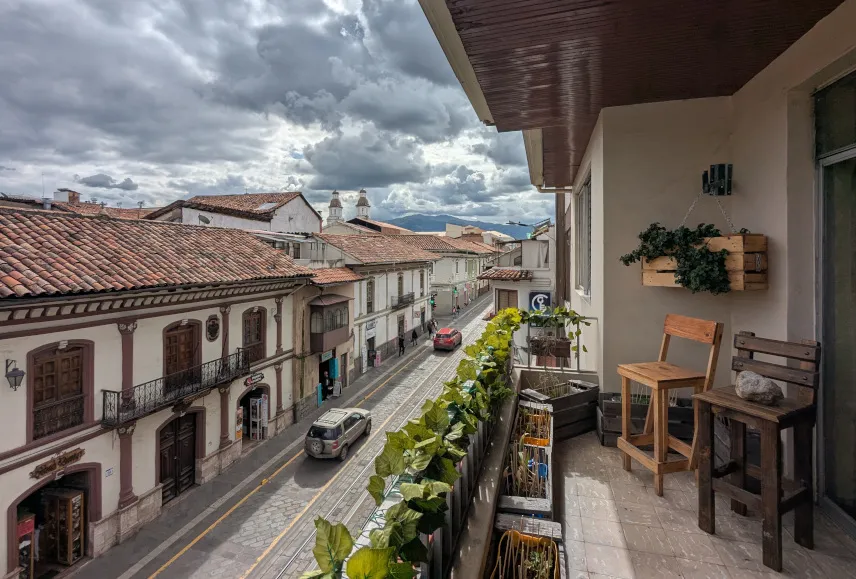
How to Get to Cuenca
Like we mentioned earlier, Cuenca is located on the Pan-American Highway, which means it is well connected to pretty much every other destination in the area, like
- Banos. 7h. There’s one day bus and one night bus.
- Guayaquil with the nearest international airport. 4h. There are multiple buses per hour during the day. We just went to the bus station and let ourselves be touted on the next bus without any problems.
- Mancora, Peru. 8h including the border crossing. There’s only one night bus per day. We didn’t find out how to book the ticket online, so we went to the bus terminal to buy it directly.
Cuenca also has a national airport with flights from Guayaquil and Quito.
How to Get Around Cuenca
The historic centre of Cuenca is very walkable.
Since 2020, a tramway connects the historic centre with points of interest like the terminal terrestre or the national airport. We found it affordable, clean, punctual, and overall easy to navigate.

20 Amazing Things to Do in Cuenca
1. Cuenca Walking Tour
We love a good walking tour to get a feel of a new city, and the walking tour through the historic centre of Cuenca was simply amazing. Tomás brought us to all the highlights as well as many super unique hidden gems we would have never found without him. Additionally, we tasted some of the local delicacies.
2. Parque Calderón
Considered the heart of Cuenca, Parque Calderón is surrounded by historic buildings and charming cafés. It is adorned with over 2,000 flowers. In 1875, writer and politician Luis Cordero Crespo planted Chilean Araucarias, which now frame the gazebo-shaped monument honouring Ecuadorian independence hero Abdón Calderón Garaycoa.
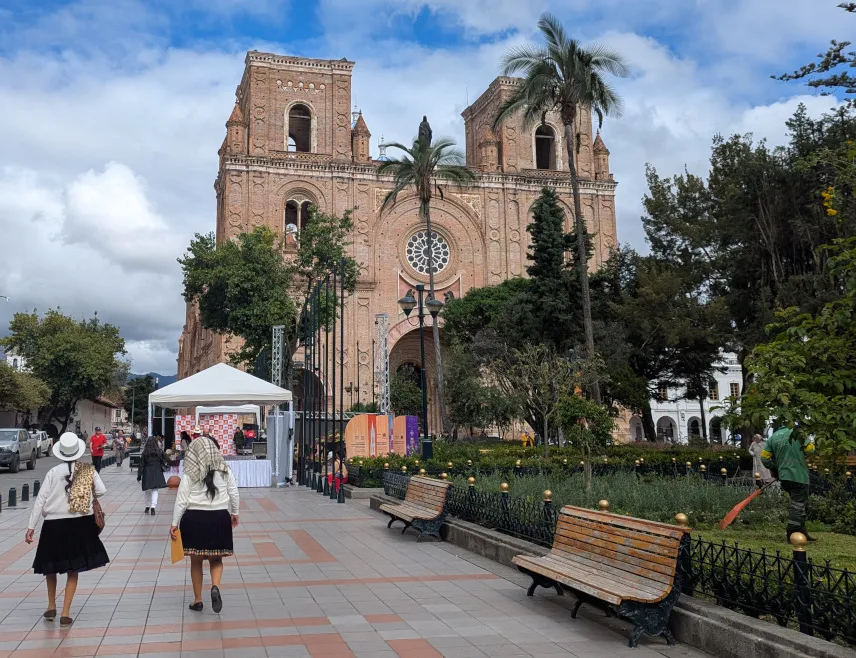
3. Catedral de la Inmaculada Concepción
The Catedral de la Inmaculada Concepción is the main church of Cuenca. It is located next to Parque Calderón.
While the inside is lovely, the highlights are the blue cupolas. For a small fee, you can climb them (the entrance is in Calle Santa Ana) and enjoy the amazing views across the city. We visited for sunset and loved every second of it.
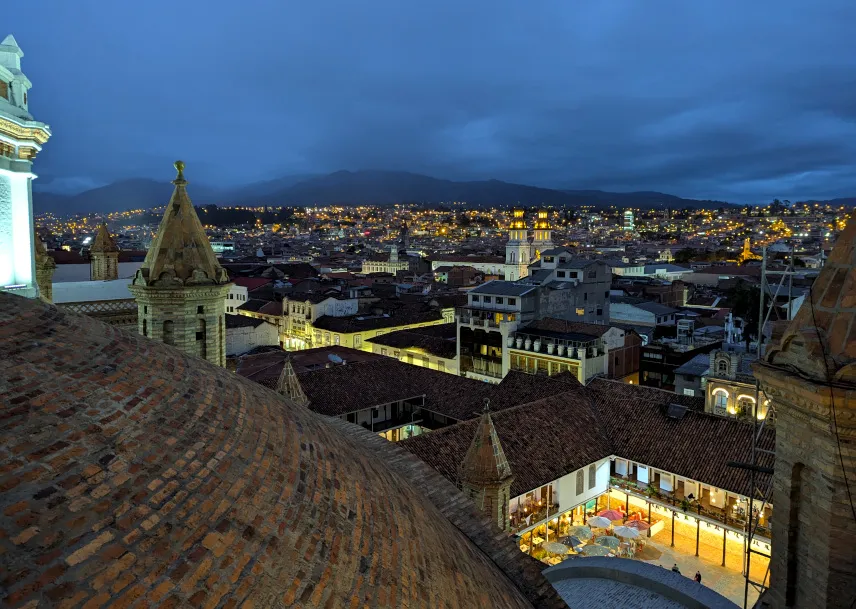
4. Seminario San Luis
At Seminario San Luis, right next to the cathedral, you can find a plethora of great food options. Keep on walking to the second yard in the back for the best view of the cathedral.

5. Corte Superior de Justicia
Another historic building that should not be missed around Parque Calderon is the Corte Superior de Justicia. Built in 1929 by architect Francisco Espinoza Acevedo, this French neoclassical gem originally housed Cuenca’s first university before becoming the Provincial Court of Azuay. The building features locally sourced marble and a striking glass-and-brass dome.
Inside, visitors can admire the light-filled atrium, historic busts, and powerful murals by Hernán Illescas depicting the evolution of justice.
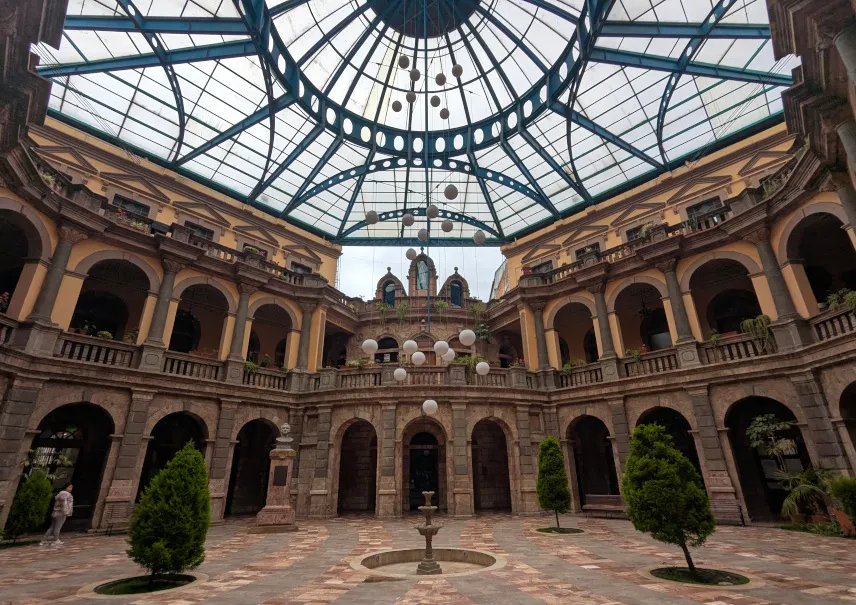
6. Casa del Parque
Last but not least, don’t miss Casa del Parque overlooking Cuenca’s Plaza Calderón. It is one of the city’s most remarkable historic residences, now restored as a vibrant cultural and gastronomic hub.
Originally built in the late 19th century, the mansion belonged to the distinguished Ordoñez-Mata family, one of Cuenca’s most influential lineages. They commissioned French architects to design a spacious residence in the fashionable style of the era. To make it truly unique, they imported fine ornamentation and decorative details directly from France.
Of course, you can visit Casa del Parque for some truly exquisite food (like in Mansión Matilde), but you can also just walk around and admire the building.

7. Museo Pumapungo
There are many great (free) museums in Cuenca, but Museo Pumapungo was by far our favourite. The complex is huge, so we recommend setting aside at least one hour.
The main building features objects found on the archaeological site of Pumapungo, an ethnological exhibit of Ecuador’s indigenous cultures (including shrunken heads), and contemporary works of art.
Outside, you can find the remains of the pyramid of Pumapungo as well as a reconstructed house.
But there’s even more to the area, like a native bird rehabilitation refuge, a botanical garden with mostly Inca plants, and a lake.
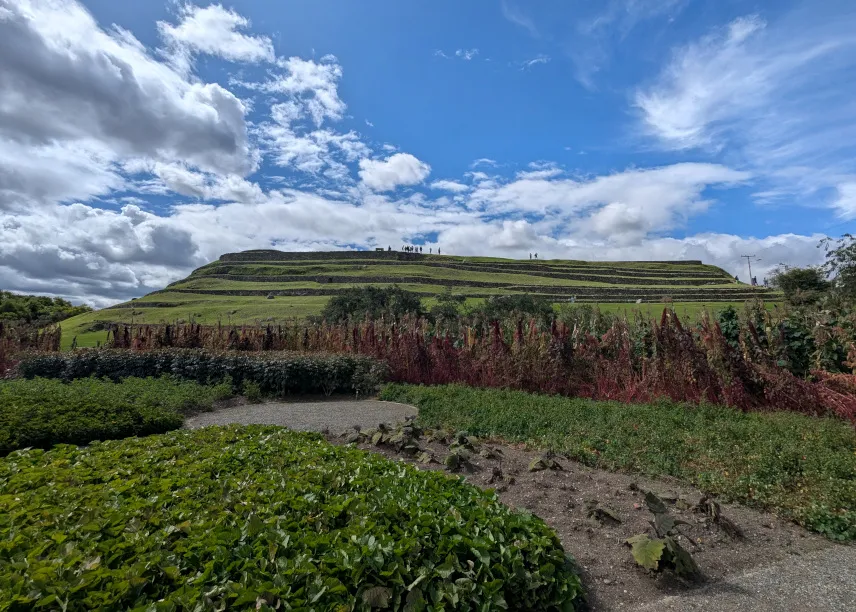
8. Centro Interamericano de Artes Populares
Another free museum that we adored is the Centro Interamericano de Artes Populares (CIDAP). CIDAP was founded in 1975 and holds the largest collection of handicrafts and folk art in the region, with 8,300 pieces from 31 countries that reflect their history, culture, and identity. We loved the combination of the well-curated ethnological exhibition and the stunning historic building.
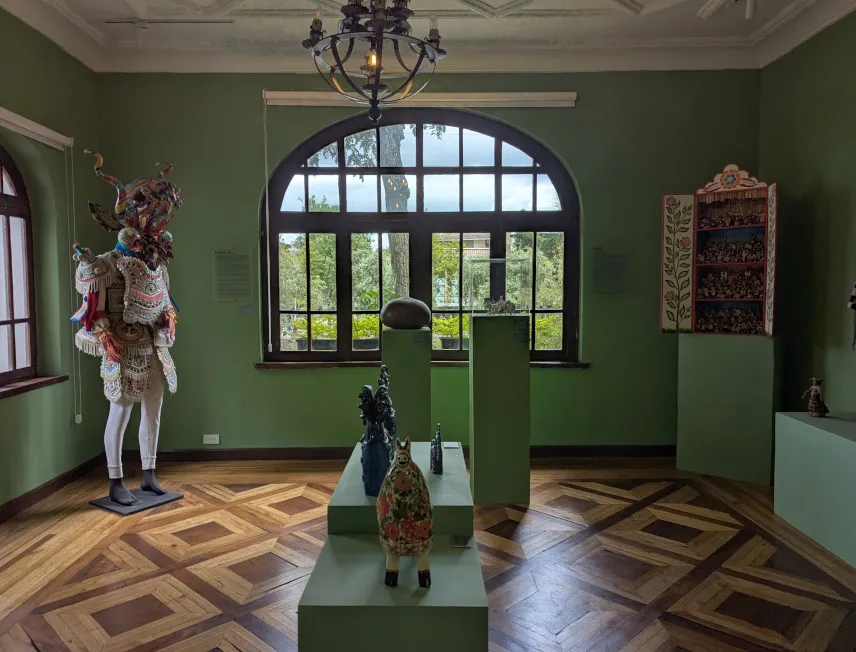
9. Panama Hat Museum
Did you know Panama hats actually come from Ecuador? In Cuenca, skilled artisans transform fibers from the Carludovica Palmata into the finely woven, hand-crafted hats.
At the Panama Hat Museum, you can follow each step of the hat-making process. Of course, you can also buy a hat if you want.
On the rooftop, there’s a cafe with nice views.
10. Museo de la Ciudad
The Museo de la Ciudad, or Cuenca City Museum, is located in a beautiful, restored old house that once housed the central school.
At the time of our visit, the small free museum showed historical as well as art exhibitions.
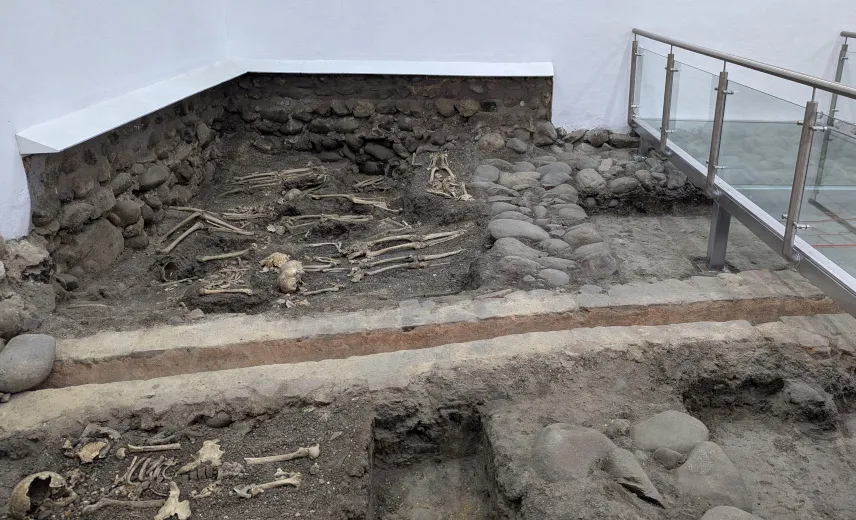
11. Museo Remigio Crespo Toral
Set in a charming five-story mansion overlooking the Tomebamba River, the Museo Remigio Crespo Toral shows off the amazing collections of the poet it is named after. You’ll find over 18,000 archaeological pieces from Ecuador’s indigenous cultures, nearly 700 colonial artworks, and lots of historical documents and objects. The museum is always growing, so there’s always something new to see – and the best part? It’s free!
12. Museo Municipal de Arte Moderno
The last on our list of free museums is the Museo Municipal de Arte Moderno (MMDAM). It's a beautiful museum with many paintings and other works of art, mostly of Ecuadorian origin. The building and gardens are beautiful as well.
13. San Francisco Craft Market
At the San Francisco Craft Market, you can find inexpensive souvenirs, clothes, and art objects. Beware that not all products might be authentic.

14. Visit a Traditional Market
We highly recommend that you visit a local market – even if you’re not hungry. There’s just no other place where you can see so much of the day-to-day life of a place.
Mercado 10 de Agosto is the main market of Cuenca. We also visited the Mercado 9 de Octubre because it was closer to our hotel and found it very worthwhile.
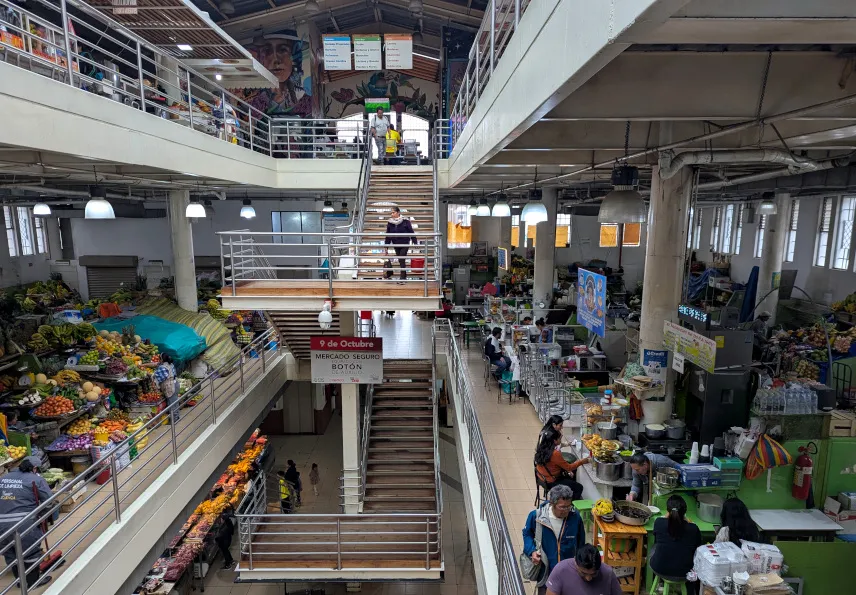
15. Cuenca Flower Market
Discover the vibrant Flower Market in front of the Carmen de la Asunción Church. The Plaza de las Flores, framed by beautiful colonial buildings, is a colourful must-see in Cuenca.

16. Street Art
Walking around Cuenca, we found so much amazing street art that it would exceed the scope of this blog post. Here’s a great map with all the most important pieces.

17. Walk along Río Tomebamba
Walking along Río Tomebamba is pleasant and relaxing. You could even opt to have a picnic at the banks of the river.
Keep your eyes open for some of the best works of street art around Cuenca, as well as sights like El Puento Roto or Broken Bridge.

18. Church of Todos Santos
The site of Cuenca’s Todos Santos Church was once the Cañari shrine of Usno. The first church was built here in 1557, and the current structure dates to 1820. The complex has endured fires and restorations, the latest completed in 2014.
You can visit different parts of the complex, like the main church, the bell tower with one of the best views of Cuenca, and the serene garden with Cañari stone terraces and thriving beds of herbs, fruits, and flowers.
Make sure to visit Santo Pan next door for some wood oven bread.

19. Ingapirca
The Inca ruins of Ingapirca are the largest ones in Ecuador and one of the main reasons to visit Cuenca. You can visit Ingapirca by direct local bus from Cuenca or opt for a guided tour.
What makes them unique is the blend of Inca and Cañari cultures. Originally a Cañari moon temple, the site later became home to the Inca Sun Temple, symbolising the union of the two civilisations.
Dating back over 500 years, Ingapirca likely served as a fortress, ceremonial centre, and stop along the Inca Trail between Cusco and Quito. Today, visitors can admire its impressive stone walls, enjoy sweeping Andean landscapes, and meet the llamas that roam the site.
There’s a longer trail around the archaeological site, including the Cara del Inca, which we can fully recommend doing.
20. Cajas National Park
We only drove through Cajas National Park on our way from Cuenca to Guayaquil, but in hindsight, we wish we had visited properly.
Cajas National Park is a breathtaking Andean highland sanctuary. With more than 235 lakes and lagoons, it offers magnificent views and a wide variety of hiking trails through the Andean páramo. Lake Toreadora, with its misty Polylepis forest and dramatic ridges, is one of the park’s most enchanting spots.
Some of the wildlife you can find includes hummingbirds, Andean condors, gulls, ducks, and, with more luck, the spectacled bear, pumas, Andean tapirs, jaguarundis, rabbits, and deer.
History runs deep, too. The Cañari people once inhabited these lands, and remnants of the ancient Royal Andean Road still cross the park. This route once connected the coast with the highlands, carrying goods such as Spondylus shells.
Where to Eat in Cuenca
We quickly fell in love with all the food options in Cuenca:
- The markets Mercado 10 de Agosto and Mercado 9 de Octubre
- Cuy (Guinea Pig) at Tres Estrellas
- The food court at Seminario San Luis for diverse food options in a historic setting
- Mansión Matilde, which is simply stunning, with a strong reminiscence of the times of the French Geodesic Mission
- Breakfast at Café Ñucallacta
- The most amazing wood oven bread at Santo Pan
- Deserts at Marcelito Pastelería Centro Histórico
- Gluten-free food at Verdecelli
- Coffee at Café de la Sucre
- Hot chocolate at Paccari Central Casa de Experiencias Cuenca
- Craft beer at Casa Yangoe
- Drinks with a view at Terra Rooftop 360
This might just be the longest list of where to eat in all of our over 200 blog posts so far…

We didn’t do it ourselves, but we found this super affordable street food tour while researching for this blog post:
How Many Days in Cuenca Do You Need
If you’re short on time, two days are probably enough to see the highlights of Cuenca.
As you might infer from the long lists of what to do and where to eat, we spent longer in Cuenca and never got bored 😉
Cuenca Itinerary
Day 1 – Central Cuenca
Set aside at least one full day to visit the UNESCO World Heritage city of Cuenca. Maybe start with a guided walking tour.
Afterwards, head to Parque Calderón with its many surrounding sights, visit some of the great (free) museums – first and foremost Museo Pumapungo –, check out the markets, and sample some of the amazing cuisine.
Day 2 – Ingapirca
On day 2, it’s time to visit the undisputed highlight of the area, Ingapirca, the largest Inca ruins in Ecuador.
Day 3 – Cajas National Park
If you have more time, don’t miss out on visiting Cajas National Park. Whether you come for hiking, birdwatching, or history, Cajas is unforgettable.
Cuenca Tips
ATMs in Cuenca
Cuenca is the third-largest city in Ecuador. You will have no problem finding ATMs from an array of banks. We used Banco Guayaquil as it had the lowest fees for our card.
Supermarkets in Cuenca
Cuenca is the third-largest city in Ecuador. You will have no problem finding supermarkets. We used the Tía Cuenca Centro as it was super close to our accommodation.
Internet in Cuenca
Cuenca is the third-largest city in Ecuador. We had great internet both in our accommodation and with our eSIM card.
Is Cuenca Safe
Cuenca is considered the safest city in Ecuador and one of the safest cities in South America. We took public transport and walked around the historic centre during the day and in the evening without any problems.
Of course, you should always exercise caution and be aware that crime – especially petty theft and pick pocketing – can occur.
This post contains affiliate links. If you use these links to buy something we may earn a commission. You would help us a lot if you do so. Thanks.


